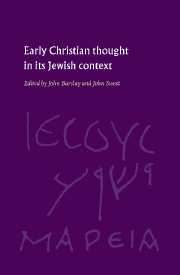Book contents
- Frontmatter
- Contents
- List of contributors
- Preface
- List of works by Morna D. Hooker
- List of abbreviations
- Chapter 1 Introductory Essay
- I THE SOCIAL CONTEXT OF EARLY CHRISTIANITY
- Chapter 2 The Jews of Judaea and Galilee
- Chapter 3 The Jews of the Diaspora
- II SOME EARLY CHRISTIAN SOURCES
- III SOME EARLY CHRISTIAN THEMES
- Index of names
- Index of subjects
- Index of texts
Chapter 2 - The Jews of Judaea and Galilee
from I - THE SOCIAL CONTEXT OF EARLY CHRISTIANITY
Published online by Cambridge University Press: 22 September 2009
- Frontmatter
- Contents
- List of contributors
- Preface
- List of works by Morna D. Hooker
- List of abbreviations
- Chapter 1 Introductory Essay
- I THE SOCIAL CONTEXT OF EARLY CHRISTIANITY
- Chapter 2 The Jews of Judaea and Galilee
- Chapter 3 The Jews of the Diaspora
- II SOME EARLY CHRISTIAN SOURCES
- III SOME EARLY CHRISTIAN THEMES
- Index of names
- Index of subjects
- Index of texts
Summary
Palestine in the first century presented a complex situation. Social, economic, political and religious aspects were all inextricably intertwined. This was the case in ancient societies generally, but was particularly so in first-century Palestine, because of the distinctive character of Judaism.
As a peasant society, first-century Palestine exhibited some social and economic characteristics common to all peasant societies (Shanin 1971). But thus far sociological and anthropological analyses have been, for the most part, too limited and question-begging. It is necessary to make the specific historical and geographical factors an integral part of the analysis and to take account of the structures of that society, with their asymmetrical power relationships.
HISTORICAL AND CULTURAL CONTEXT
Roman control of Palestine from 63 bce was part of a long succession of foreign domination, from 587 bce onwards. This had, however, been broken in the relatively recent past by the independent Jewish Hasmonean monarchy, from 134 to 63 bce. The successful revolt against the aggressively Hellenizing policy of Antiochus IV remained in the collective memory of the Jewish people, as did the threat from Antiochus of annihilation of their distinctive way of life. From 63 bce onwards, Jews in Palestine (as elsewhere) had been under Roman rule, though this was mediated in 39–4 bce by the (often tyrannical) reign of the client king, Herod the Great.
- Type
- Chapter
- Information
- Early Christian Thought in its Jewish Context , pp. 9 - 26Publisher: Cambridge University PressPrint publication year: 1996



